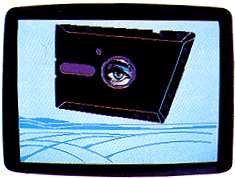REVIEWS
Mind Prober
Richard Mansfield, Senior Editor
System requirements: Commodore 64 and a disk drive; IBM PC with at least 128K RAM and a disk drive; Enhanced Model PCjr, Apple II-series computer with at least 48K RAM and a disk drive; Apple Macintosh; or Hewlett-Packard HP-110. Printer optional.
There is an old trick used by fortune tellers, horoscope casters, psychics, and bad psychologists: symmetrical analysis. It works like this: You make an observation, then contradict it. For example, tell someone that they're generous, and yet careful with their money.
Most people will believe that they're generous and that they're careful, even though these character traits are in direct conflict. By balancing them against each other, however, you've been sufficiently complimentary and sufficiently vague that your observation is likely to be believed, likely even to be thought insightful.
Yet a truly meaningful character analysis must be specific. If it's not specific then it's too true, true of everyone, like horoscopes.
Specific And Accurate
Mind Prober, a new personality analysis program from Human Edge Software, succeeds surprisingly well; it's often specific and it's often accurate.

An ominous title screen from Mind
Prober (IBM version).
To use it, you type in the name of a person you want to analyze. It can be you, your boss, your best friend, anyone, but the better you know the subject, the more specific and accurate the analysis is likely to be. Then you tell the program whether or not the subject is over 18 and if it's a male or female.
The analysis begins. A series of some 60 adjectives starts appearing onscreen. For each one, you must either agree or disagree that the word describes the subject. If you cannot decide, you can press the H key and see a fuller explanation.
Here's part of the list: rebellious, opinionated, sarcastic, aggressive, cynical, self-righteous, accomplishing, worrisome, sympathetic, emotional. In each case, you would type A for agree or D for disagree. If you asked for further help with, say, accomplishing, you'd see this fuller definition: able to bring a task to completion; achieving.
Some of the questions seem redundant, but perhaps that's a way of defining the degree of a given character trait. For example, you are asked AGGRESSIVE? and then later, CAUTIOUS? The entire quiz is reminiscent of psychological tests given in schools.
What Makes Him Tick?
When you've finished giving your answers, you can request a report. This consists of 13 paragraphs which purport to describe several facets of the subject's personality. The report is divided into seven sections: personality summary, relationships, attitudes toward work, coping with stress, personal interests, attitudes toward sex (or school, if the subject is under 18), and what makes the subject tick (general motivational factors).
A summary, for example, might say: You're likely to find Mr. Don O'Connell behind the scenes in most situations. He is a quiet person, preferring to follow rather than lead. His general approach to life is no-nonsense, and he likes to stick to the facts. He is conscientious and detail-oriented.
This description is typical of the detail and specificity of Mind Prober and the reason that it is an impressive piece of software. This summary would not, obviously, be true of everyone.
The software's documentation claims that the reports are based on "massive amounts of information" in an "expert system" on the disk. Unfortunately, the program is copy-protected, so you can't examine its methods, its data, or store more than eight assessments at any given time, because the program stores its reports on the program disk. If you try to assess a ninth personality, you'll have to first remove one of the older reports. You can, however, direct reports to your printer for archiving.
The Thinker Type
Accompanying the program is a book which makes some rather elaborate claims for itself: Analyze anyone, find out the hidden truths, how to read others, how to get ahead in business, etc. The text is one of those uneasy pop-psychology musings wherein the obvious competes with the dubious. And what's not obvious or dubious is largely superficial. In describing how to tell a person's "type" by his or her gait, we are advised that "The Thinker" type holds their "heads and shoulders pointed toward the ground, indicating that they are preoccupied and do not wish to be disturbed. Typically, their hands are clasped behind their backs and their gait is slow and methodical." All this seems somewhat more plausible than phrenology, but only somewhat.
Nevertheless, the software itself is often startling in its accuracy. Oddly enough, the greatest source of error with Mind Prober appears to be when you answer questions about yourself. This would seem to violate the rule that the better you know someone, the better the analysis. But perhaps it merely points up the fundamental quality of the program's database and set of equations-self-analysis is very difficult. It also serves to distinguish Mind Prober from those little personality quizzes found in some magazines.
While it seems unlikely that Mind Prober will make your dreams come true, it is an in triguing way to spend an afternoon. And it creates reports with enough surprises and insights to suggest that there is something complex and potentially powerful going on as that protected disk whirls around, creating a personality profile of some depth and precision out of a brief true-false test.
Mind Prober
Human Edge Software Corporation
2445 Faber Place
Palo Alto, CA 94303
$29.95 (Commodore 64 version)
$49.95 (All other versions)